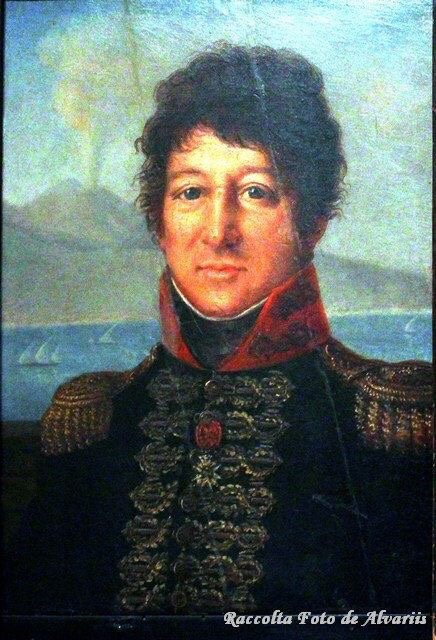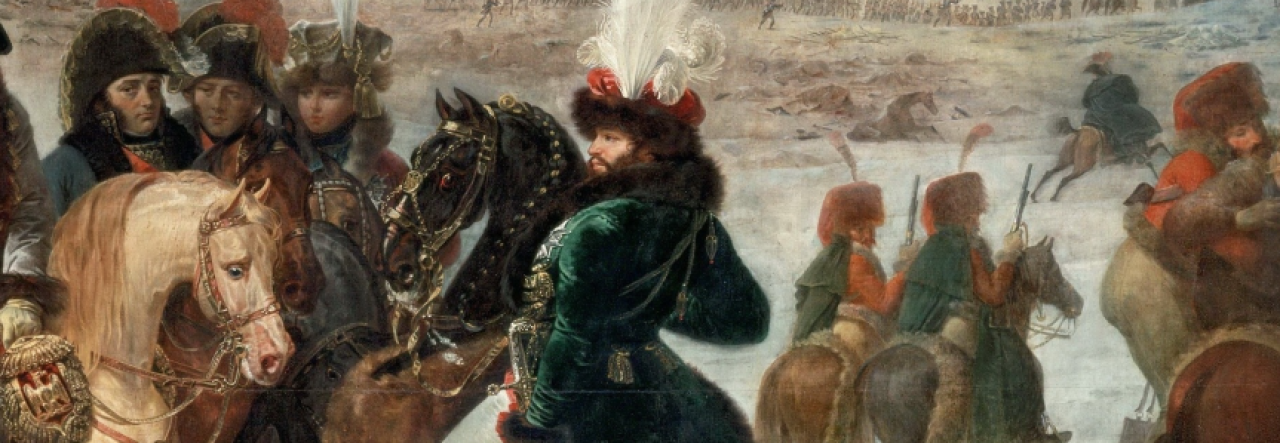
Louise Murat includes in her memoirs six letters written by her father between 1813 through his defection from Napoleon (the last letter in this series, from immediately after his treaty with Austria was signed, can be read here from Jean Tulard’s biography of Murat). The following letter is the first in the series, addressed by Murat to Empress Marie-Louise, prior to the 1813 campaign. There is still considerable tension between Murat and Napoleon at the time of this letter as a result of Napoleon’s excoriations of Murat–both in private letters and publicly via the Moniteur–for leaving the army during the retreat from Russia without the Emperor’s permission. Murat is hoping Marie-Louise will act as an intermediary between himself and Napoleon. His feelings are conflicted; he wants to take the field with Napoleon, yet worries about leaving Naples vulnerable in his army’s absence. At the same time, feeling increasingly pessimistic of the future of the Empire, Murat is now in the midst of negotiations with Austria–their ciphered offer will be delivered to him as he is en route to join Napoleon for the coming war. Not having the cipher key with him, he will send the letter on to Naples, and continue on his way to fight alongside the Emperor for one final campaign.
***
Source: Souvenirs d’enfance d’une fille de Joachim Murat, by Louise Murat, pages 144-147.
Portici, 11 May 1813
To Her Majesty the Empress and Queen
Madame, Your Majesty has been kind enough to inform me by telegraph and by the intermediary of the Prince Borghese of the departure of the Emperor for the army. I was far from Naples when this information arrived here; it was transmitted to me in Taranto. Such a circumstance alone could delay, Madame, the thanks that I owe to Your Majesty for her attention full of kindness, and the cost of which I feel. Although the news of the Emperor’s return to the army was not unexpected by me, I was not able to learn of it without an emotion vivid and profound. We are going to fight, and I will not fight; the Emperor is going to brave new dangers and I will not be called to share in them. These ideas agitate and afflict my heart; they besiege me as a soldier, as a devoted friend of my old general, and as a loyal ally of the head of the Empire. Yet I cannot dissimulate to myself, and I’ve had to say to the Emperor myself that my presence is necessary in Naples. I would have betrayed him by using other language. It would have been dangerous to delude him on the state of Italy or the thousand intrigues and thousand passions keeping spirits in motion. Already perhaps, many disorders would have taken place if it were not known that I am here, with an army ready to go anywhere it might be needed to make the rights of the Emperor and the interests of the Empire respected. Distancing myself, or distancing my troops, this would be, I have the most intimate conviction, to lose not only my kingdom, but also the rest of the peninsula. The desire that I had to make war must be ceded to such high circumstances, and the certitude that, nowhere, would I be able to serve the Emperor more usefully than in the post where I am, must console me for not being beside him. But nothing can ease the anxiety into which I’ve been delivered by the dispositions manifested by the Emperor in my regard since my return to Naples.
In several circumstances, he has expressed sentiments unfavorable towards me; he has taken measures of mistrust that were meant to wound me; he has addressed to me demands which he knew were impossible for me to satisfy. He has not given me any explanations that I’ve requested from him; he has not granted me any of the facilities of which I had need in order to procure arms and horses in France intended for his service; he hasn’t communicated any of his views to me; he has furnished me no instruction on the conduct to take in Italy. If I knew less of the Emperor’s genius and the extreme attention with which he rules all affairs himself, I might believe that, in the Cabinet of the Tuilleries, everything has been directed by my enemies, with the intention of causing me difficulties and preparing griefs against me, in order to assert them at other times. Such relations are distressing; I must add that it is impossible for me to lie about them entirely to my subjects, which alarms the most loyal ones, emboldens the ill-intentioned, and gives hope to our common enemies.
I dare to beseech you, Madame, to assist in putting an end to such an unpleasant state of things. It is up to Your Majesty, to enlighten the Emperor who is misled on the state of Italy, and to restore in him the trust that I believe to have acquired the right to claim by twenty years of vibrant service and by a devotion that even unjust practices could never alter.
May the Emperor deign to explain himself, may he make his intentions known clearly and completely; I would employ my efforts to fulfill them, but his isolated dispositions, which seem to foreshadow other successive dispositions and which, tending continuously to weaken me, expose me to staying here in the impotence of facing our enemies; dispositions which are consequently compromising both to my glory and to my States, which can only provoke on my part just representations, at the same time that they sustain the painful incertitude that I suffer over the sentiments of the Emperor.
Custodian of the Imperial Government, occupied with the happiness of France and the great interests of Europe, Your Majesty would not disdain to give some cares to the objects to which the fate of Italy is attached, which form such an important part of the Empire and on which depend my happiness as well as that of my family. It would be my pleasure, Madame, it would be the pleasure of the Queen and my children to recognize in Your Majesty new titles to our gratitude and to the affection that you have inspired in us.
[Signed] Joachim NAPOLEON
***

Napoleon did the same thing to his brothers. Poor Murat! I like that portrait of him.
LikeLiked by 1 person
To his brothers, and to his generals and marshalls as well. Give them an impossible task, never answer any question properly, and then blame them when things go wrong. – To some degree, I can see why he felt it was neessary that his person remained blameless; his “genius” was the only base for his claim to rule.
But it doesn’t make him look good.
LikeLiked by 1 person
I wonder how Marie Louise felt about Murat? By all accounts, she was completely under the influence of the Duchess de Montebello – aka Louise Lannes, widow of Murat’s old Gascon buddy. (I always found it funny that among all the ladies at court, Marie Louise would befriend the one who, again by all accounts, could adapt the least to court life. Just like Lannes never had.)
LikeLiked by 1 person
That’s something I’d need to dig into—so far I haven’t come across a single thing regarding how either Marie-Louise or Louise Lannes felt about Murat. Caroline attempted to cultivate a friendship with Marie-Louise during their initial meeting when Caroline accompanied her on the way to her wedding with Napoleon; apparently she and Joachim were both worried about her being able to do them harm because of her relation to the other Queen Caroline (in Sicily) so they wanted to win her over. But somehow Caroline managed to torpedo this relationship not too long afterwards; Marie-Louise writes vaguely of Caroline saying something to her that made it impossible for Marie-Louise to ever feel affection for her again. 😅
Lannes and Murat were close, certainly closer than people who like to read too much into their professional rivalry want to credit, but that doesn’t necessarily mean Lannes’ wife was a fan of Murat—she absolutely *loathed* Napoleon, after all, and apparently made sure his correspondence to Marie-Louise never made it into her hands while he was on Elba.
LikeLiked by 1 person
I always thought the animosity between Caroline and Marie Louise had to do with Caroline sending back Marie Louise’s friend the countess Lazansky. Could this be what Marie Louise was referring to? Though it is also said that Louise Lannes had lamented about the continued presence of this Austrian, too; which would make it improbable for Marie Louise to then seek her friendship.
As for Louise Lannes keeping up or destroying Napoleon’s letters – do you know what the source? Because I’m all intrigued and almost feel like I have some more chronology research to do :p. I might be mistaken but I think this factually is almost impossible, as Louise only accompanied Marie Louise to Vienna for a couple of days, before returning home to her children. Highly interesting!
LikeLike
So I’ve been searching throughout the day to find the references I was thinking of. I finally found the one regarding Marie-Louise & Caroline, after skimming through The Betrayers for the fifth time. While Marie-Louise was definitely unhappy about being made to part from Madame Lazansky, she wrote to her father that it was a sacrifice she must make for her new husband, and it doesn’t seem to have done too much harm to her relationship with Caroline (even if Caroline wasn’t quite as tactful about it as she might’ve been). But apparently the relationship started to sour when Caroline went with Marie-Louise and Napoleon for awhile into Belgium after the wedding and Caroline became excessively cranky during the tiring journey:
“She accompanied Marie-Louise as far as Cambrai on the Belgian tour; dragooned by the emperor along jolting roads, called before dawn for the next day’s journey, tramping round factories, standing interminably at civic receptions, being dragged in boats through the tunnels of the Tronquay Canal with water up to their knees, and waiting in wet clothing while their carriages were dismantled and carried in sections over too-narrow bridges. ‘This operation delayed us by a good hour and put the queen of Naples in such a bad humor that one could not speak to her for the rest of the day,’ Marie-Louise recorded in her diary on April 29. The testiness was infectious, for when Caroline, exhausted and suspecting that she was pregnant again, decided to return to Paris, the young empress noted, ‘I am not sorry, I have a bone to pick with her, because… but in this world one must forgive injuries; I resign myself to it, but I shall never have a high opinion of her again.’ Marie-Louise did not say what the injury was, but it was clearly pique that, after flirting with ‘that wretched fop’ Metternich and ‘Uncle Ferdinand,’ Caroline had encouraged both of them to return to Paris with her.” (The Betrayers, pg 140)
Interestingly, during my search for that tidbit I found an excerpt elsewhere of a letter from Napoleon to Marie-Louise in March of 1814 where he gives an emphatic negative response to a request she seems to have made as to whether she could write to Caroline.
I’m going to concede defeat re: the Duchess of Montebello. I can’t find anything in particular though I feel like I remember her being involved in *some* sort of intrigue. But from what I found during my digging today, it was apparently the agents of Metternich who intercepted and destroyed most of Napoleon’s letters before they reached Marie-Louise during his exile.
LikeLiked by 1 person